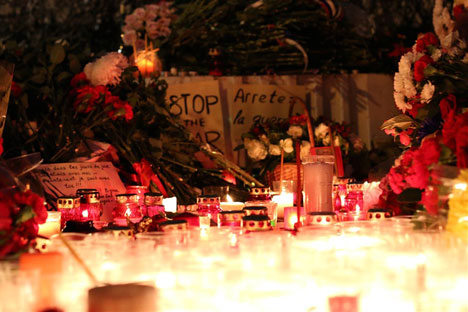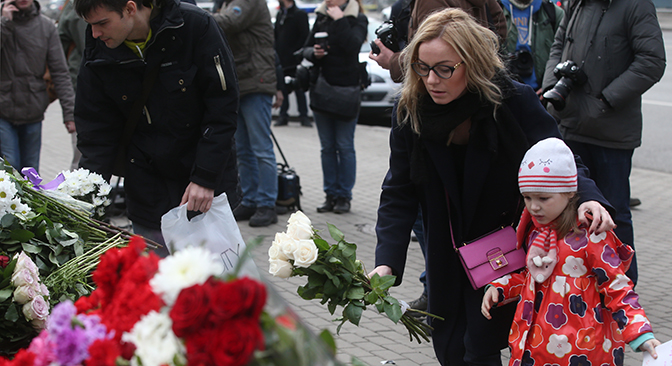
Russia stands together with France.
Russia DirectA huge pile of flowers, candles and icons has been neatly put together near the French Embassy in Moscow. The collection is pretty impressive, about seven to 10 meters in length and four to five meters in width. A line of people 100 meters long extends all the way from the Oktyabrskaya metro station in central Moscow, near the location of the French Embassy.
Muscovites have been coming to the embassy since midnight after the Nov. 13 terror attacks in Paris. They bring not only flowers, candles and icons, but also small hand-made posters. “Pray for France,” “Stop the War,” “Je suis Paris,” “Be strong Paris, Russia will always be near you,” they read in three languages: French, English and Russian.
Like many Russians, Vladimir, 45, an economist, was shocked and perplexed after the terror attack in Paris. “I felt a sort of confusion,” he told Russia Direct. “I don’t know why such things happen. The events in Paris are a continuation of all these tragedies.” Nevertheless, he tries to show no sign of fear and panic, “only because you try not to think about it” in day-to-day life.
“I have come here just to stand nearby and join a group of good people who did not hesitate to express solidarity and commit a civil act,” he said. “I am very glad that there are people in Russia who are coming here to express their support [for France and Europe], because I am not optimistic about Russia and its society.”
When asked if the terror attack in Paris will bring Russia and the West together in their fight against global terrorism, he questioned this possibility because “the hypocrisy” and intransigence of the Russian authorities, as well as their anti-Western rhetoric, won’t lead to the type of cooperation that could have emerged after the Sept. 11 terror attack in New York in 2001, he said.
“When I was coming here, I felt a deep feeling of compassion toward the victims of [the attack in Paris], even though I don’t know them,” said Ivan, 28. “Nobody has the right to deprive somebody of life, especially through such perfidious means. I don’t know how to fight it. Such attacks happen everywhere in the world and I cannot feel safe 100 percent. Who knows what might happen: Today we are walking and breathing air but tomorrow we might lose it.”
Even though the Russian authorities plan to increase security control nationwide, including on all public transportation, Ivan is skeptical that it will resolve the problem of the terror threat, because “it is impossible to track down a huge flow of people” coming in and out of the country.
A friend of Ivan’s, Maxim, 29, preferred to agree with the many experts who are calling for tightening the regulation of refugee flows. He argued that such an attack was predictable because France gave asylum to many Syrians, who, he said, might have been recruited by terrorists. That’s why the authorities “should, first and foremost, control the flow of refugees,” he insisted.
“Such attacks are inevitable [in Russia] and we should withstand them somehow,” said Vadim Solovyev, the leader of the Digger-Spas rescue group, an independent center that collaborates with Russia’s Emergency Ministry. He also came to bring flowers to the French Embassy to support the people of France.
“Every murder, let alone a large-scale terror attack, leaves a deep feeling of pain, we go through it as if it were our own,” he told Russia Direct.
“That’s why we clearly understand that this [the terror attack] might happen at any moment and in any place on the planet. So we should be prudent and careful, because the state of security will not always be on high alert and it is impossible to predict all scenarios. We all should withstand this global evil. We should not fall out over political issues, but have to understand with our whole heart and soul that we have a common enemy, which should be destroyed.”

Muscovites lay down flowers at the French embassy on Nov. 14, 2015. Source: Serguei Fadeytchev/TASS
Amelie, 20, a French exchange student, who studies at Lomonosov Moscow State University, also came to the French Embassy. When she found out about the terror attack, she canceled her fight and reassessed her travel plans.
“I learned this news in morning and was totally shocked,” she said. “Even though I feel safe in France and Russia in general, I don’t feel comfortable when I fly. Before the terror attacks in France, I wanted to use the flights, but changed my mind afterwards.”
Russian experts agree that the terror attack should result in Russia and the West teaming up in their fight against global terrorism and the Islamic State of Iraq and Greater Syria (ISIS).
Alexander Rahr, program director at the German Council on Foreign Relations (DGAP) and a member of the Valdai Club (a political and economic discussion forum that takes place annually in the town of Valdai near Moscow – Russia Direct) argues that the deadly attack in Paris is comparable with the September 11 attack in New York in 2001.
“We could imagine today that the NATO countries will team up with France, like was the case in 2001, when they expressed their solidarity with the U.S.,” he told the Valdai Club. “We could also imagine that they will fight in Syria against ISIS and this opens a lot of opportunities to agree with Russia on a joint counter-terrorism campaign.”
“I think it is high time countries put aside the geopolitical ambitions of certain actors (including over Ukraine) and fight together against the main challenge for the West and Russia: ISIS. This is a state, and if we don’t stop it, they will seize territories, weapons, and — God forbid — they might obtain nuclear weapons,” said Rahr.
However, some Western experts doubt that Russia is really sincere in its declared goals in Syria to fight ISIS and team up with the West, which hampers the possibility of a reliable and long-lasting cooperation between the Kremlin and the West. For example, Michael O’Hanlon, senior fellow and director of research at Brookings Institution's Foreign Policy Department, argues that Russia's major goal is to back Syrian President Bashar al-Assad.
"I don't admire Russia's role in Syria so far," he told Russia Direct. "I think the declared purpose of fighting ISIS is not sincere, and that in fact Russia is interested primarily in propping up Assad."
At the same time, O’Hanlon admits that "there may be a way to reconcile Russian and American interests" to find ways just "to minimize the dangers of working at cross purposes with each other, or even coming into direct accidental conflict with each other."
The terror attack in Paris has also put into question the European policy toward Syrian refugees, who are suspected to be recruited by ISIS and other terrorist groups. For instance, Ivan Blot, a member of the Valdai Club, professor at the University of Nice and Nicolas Sarkozy’s private advisor, says that the French are really shocked and many of them tend to “blame the immigration policy that let a lot of Muslims into the country.”
"Of course, the majority of them are peaceful but an important minority is really very dangerous,” he told the Valdai Club.
Similarly, some Russian experts also agree that the risk that terrorists will come to Europe together with refugees is substantial and that was one of the reasons why the Kremlin has been reluctant to provide asylum to Syrian refugees. Alexei Grishin, the president of the Russian think tank Religion and Society, said during his Sept. 16 speech at Carnegie Moscow Center that “ISIS has been actively using the migration flows for their own purposes.”
According to him, extremists could do recurring harm in a host country or secretly conduct information campaigns. The fact that many refugees come with about $3,000-4,000 in their pockets looks very suspicious to him. Grishin also raised his eyebrows at what he sees as "a big Sunni contingent" among refugees. He finds this fact suspicious, because ISIS is comprised of Sunni Muslims, who he claims are hardly likely to pursue and drive their religious and ideological peers out of the country.
First published by Russia Direct.
All rights reserved by Rossiyskaya Gazeta.
Subscribe
to our newsletter!
Get the week's best stories straight to your inbox